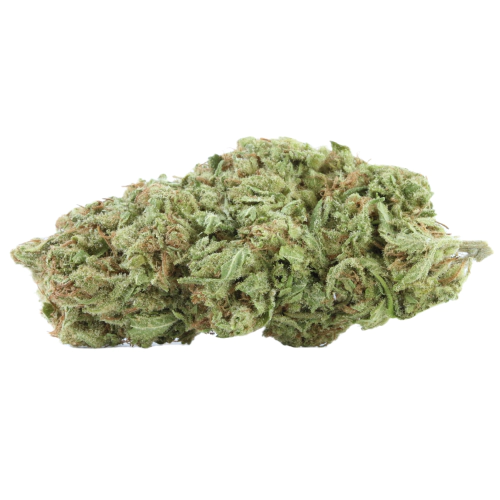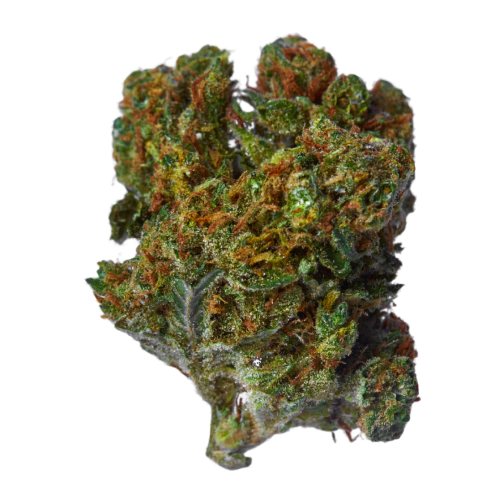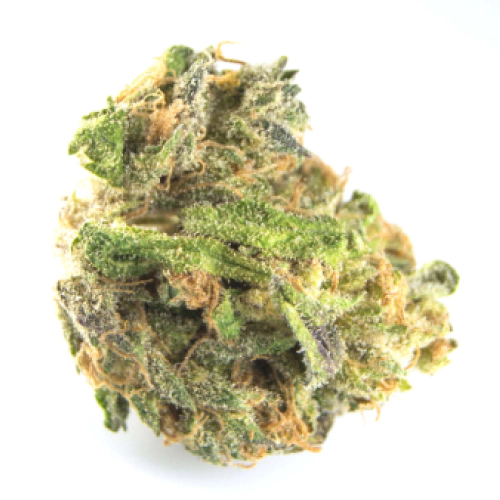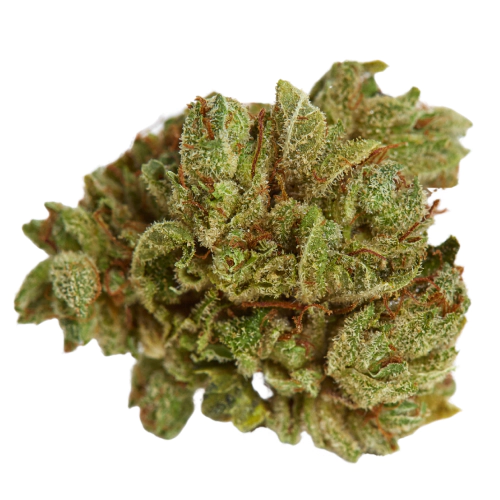THC 18.6 - 20.2%
CBD 0.49 - 0.85%
Effect Sleepy
Flavor Spicyherbal
20 - 21%
0.45 - 0.68%
0.79 - 0.91%
Spicyherbal, Diesel
Sleepy
The Cali Berry strain is a 50/50 balanced hybrid that features a THC content of 20-21%. It is a cross between Ben N Berries and Reckless Rainbow. The strain is not renowned for having a high amount of CBD. The highest recorded CBD levels are 0.45-0.68%. This cannabis is rare and famous for its unique aroma profile and rich cannabinoid composition:
The strain is unsuitable for novice marijuana consumers due to its potent effects.
The aromas provided by Cali Berry vary a great deal. Herbal, spicy, and diesel scents waft into the air as smokers break the nugs apart. Also, the flowers emanate delicious sweet floral, berry, mango, and apricot scents along with notes of earth and sage on the exhale. The plant contains diverse terpenes, but the dominant compounds are limonene and myrcene.
The Cali Berry weed effects are strong and long-lasting so that smokers feel relaxed and sleepy before they know it. First, users experience a euphoric onset that fills them with an uplifted sense of happiness. Then comes physical relaxation accompanied by tingles in the limbs that launch people into a couch-locked state. After that, a pang of hunger appears, which can help people with a lack of appetite. There can be possible fits of giggles as reported by single users.
Although the Cali Berry strain attracts recreational users, it is a much-loved option for medical marijuana patients. Due to its properties, this kush helps alleviate the symptoms of:
Depending on how people tolerate THC intoxication, they may experience negative reactions after smoking Cali Berry. Possible adverse effects are:
Cali Berry develops medium-sized shrubs that are 30-60 inches high. The nugs are dark green with blue undertones and feature thin orange hairs. The blooming stage of the plants starts in 53-62 days, and they are ready for harvest in 60 days. It is an easy-to-grow phenotype that yields at 1-2 oz./ft2 indoors and 10-15 oz./plant outdoors.
| THC | Tetrahydrocannabinol, or THC, is a major cannabis chemical compound. It is a psychoactive element that stimulates dopamine release and induces euphoria or happiness. THC-rich strains may be helpful with such conditions as lack of appetite, chronic pains , etc. It is considered to be the primary active marijuana component. | 20 - 21% |
| CBD | Cannabidiol, or CBD, is a major compound in cannabis, which is non-psychoactive. It is also proved to counteract the side effects of the second major component THC. CBD is widely used for medicinal purposes in rubs, oils and so on. It is helpful in muscle pain cases, may treat arthritis and migraines. Even Greeks used it against pain, while Queen Victoria applied it to get rid of menstrual cramps. | 0.45 - 0.68% |
| CBC | Cannabichromene, or CBC, is a minor cannabinoid, meaning that its quantity in cannabis is quite little. Though it has the same origin as CBD and THC, it is different in functions. Without any psychoactive effects, it is an efficient cannabis compound in combating acne and depression. CBC produces analgesic, antibacterial and anti-inflammatory effects. | 0.46 - 0.58% |
| CBG | Cannabigerol, or CBG, is one of the minor cannabis compounds in adult plants. On the other hand, young ones contain a lot of this antibacterial and anti-inflammatory component. During the growth, CBG is converted into different cannabinoids, mostly THC and CBD. The compound itself increases appetite and decreases eye pressure. | 0.79 - 0.91% |
| CBN | Cannabinol, or CBN, is a trace element in cannabis that is considered to be mildly psychoactive. It appears from oxidation THC, exposed to light and heat. CBN is mostly contained in old cannabis and in traditional hashish. It is effective against insomnia, bacterial infections and appetite loss. | 0.49 - 0.69% |
| THCV | Tetrahydrocannabivarin, or THC-V, is a compound contained in cannabis in trace amounts. Even though it is close to THC molecularly, it is different in effects. This compound may be psychoactive only in large amounts. THC-V reduces blood sugar, controls appetite, stimulates bone growth, etc. African Sativa strains are the richest in THC-V. | 0.49 - 0.58% |
| Carene | Carene (also known as Delta-3 carene) is a terpene found in rosemary, lemons, pines, and cedars, offering citrusy and cypress aroma. Studies on mice showed that carene provides anti-inflammatory effects, as well as promotes bone health and chronic pain relief. | 0.03% |
| Pinene | Pinene is one of the most widespread terpenes in nature, found in pine trees, basil, nutmeg, parsley, and rosemary. Cannabis containing terpene (alpha-pinene or α-pinene) boasts a strong pine scent. Pinene is responsible for anti-inflammatory, pain-relieving, and anti-anxiety effects. | 0.12% |
| Myrcene | Myrcene (also known as β-myrcene) is one of the most common terpenes found in cannabis, representing more than 20% of the modern marijuana terpene profile. Myrcene has a distinct earthy, musky flavor, resembling cloves. It is responsible for calming and soothing effects of weed. Myrcene is also found in hops, thyme, mango, lemongrass, guava melon. | 0.23% |
| Humulene | Humulene (also known as α-humulene) is one of the major terpenes found in cannabis, contributing to woody, earthy, spicy, herbaceous, and, mainly, floral aromas of cannabis. Used in modern medicine, humulene offers anti-inflammatory, antibacterial, and appetite suppressant effects, which have been well-researched by pharmaceutical companies. | 0.13% |
| Limonene | Limonene (also known as d-limonene) is the second most common terpene in nature and the third most common terpene in cannabis. It has a powerful citrus aroma and can be found in all citruses, including lemons, oranges, grapefruits, limes, juniper, etc. Limonene is known to elevate moods and provide anxiety, depression, and stress relief. | 0.25% |
| Linalool | Linalool (also known as beta linalool, linalyl alcohol, linaloyl oxide, and p-linalool) is one of the rarest terpenes found in cannabis, mostly in small quantities. Linalool is known for its spicy and lavender aroma, bringing relaxation and calming effects. It is also said to provide anti-inflammatory and analgesic properties that can be useful for athletes. | 0.01% |
| Bisabolol | Bisabolol (also known as α-Bisabolol or levomenol) is a lesser-known terpene found in cannabis. It contributes to anti-inflammatory, anti-irritant, antioxidant, anti-microbial, and analgesic properties of weed strains containing bisanol. Attentive smokers would be able to catch a nutty, fruity scent with herbal and floral undertones, with a tender trace of coconut. | 0.04% |
| Phellandrene | Phellandrene (also known as alpha- and beta-phellandrene) is one of the rare terpenes found in cannabis with antihyperalgesic and antidepressive properties. Phellandrene contributes to a minty, woody, and mildly citrus aroma in cannabis. Previously confused with limonene and pinene, phellandrene was eventually distinguished as a separate terpene common for eucalyptus. Also, it could be found in mint, dill, black pepper, cinnamon, parsley, pine, and lavender. | 0.11% |
| Caryophyllene | Caryophyllene (also known as beta or b caryophyllene) is a terpene found in many herbs and spices, such as black pepper, basil, rosemary, and oregano. Cannabis high in caryophyllene delivers a strong spicy, peppery aroma, resembling cinnamon and cloves. Caryophyllene offers potent anti-inflammatory and sedative effects. | 0.09% |
| Total terpenes content | 1.01% |
THC 18.6 - 20.2%
CBD 0.49 - 0.85%
Effect Sleepy
Flavor Spicyherbal
THC 20.17 - 22.67%
CBD 0.52 - 0.92%
Effect Giggly
Flavor Sweet
THC 19.5 - 23%
CBD 0.19 - 0.62%
Effect Concentrated
Flavor Sweet
THC 22 - 26.5%
CBD 0.22 - 0.84%
Effect Uplifted
Flavor Pungent
THC 13.38 - 15.38%
CBD 0.68 - 0.96%
Effect Sleepy
Flavor Berry
THC 8.5 - 10.5%
CBD 0.55 - 0.63%
Effect Calm
Flavor Honey

THC 17 - 19.6%
CBD 0.47 - 0.75%
Effect Sleepy
Flavor Diesel
THC 20.4 - 21.4%
CBD 0.71 - 0.91%
Effect Relaxed
Flavor Diesel
THC 18.4 - 22.4%
CBD 0.31 - 0.62%
Effect Sleepy
Flavor Earthy
THC 31 - 33%
CBD 0.41 - 0.56%
Effect Relaxed
Flavor Spicyherbal
THC 21.67 - 23.67%
CBD 0.37 - 0.59%
Effect Euphoric
Flavor Sweet
THC 19.5 - 23%
CBD 0.35 - 0.92%
Effect Happy
Flavor Spicyherbal

THC 15.75 - 17.75%
CBD 0.49 - 0.6%
Effect Sleepy
Flavor Berry

THC 20.75 - 24%
CBD 0.25 - 0.56%
Effect Relaxed
Flavor Spicyherbal
THC 15 - 19%
CBD 0.03 - 0.86%
Effect Giggly
Flavor Sweet
THC 17.37 - 22.45%
CBD 0.24 - 0.63%
Effect Tingly
Flavor Pungent

THC 22.25 - 24%
CBD 0.58 - 0.91%
Effect Sleepy
Flavor Pungent
THC 19.5 - 25.5%
CBD 0.48 - 0.76%
Effect Tingly
Flavor Sweet
Be the first and share your opinion
Write a Review